Top 5 B2B Tokenized Real Estate Platforms
Ranked list of the five leading B2B platforms enabling institutions to tokenize, distribute and manage real-estate assets—features, fees and user base.

Real estate tokenization is unlocking enormous value by turning properties into tradable blockchain tokens. Experts estimate this could free up nearly $16 trillion of global asset value by 2030. This isn’t theoretical: projects in places like Dubai, Florida and Tokyo have already put real properties on-chain. In fact, a recent Dubai government initiative is creating an on‑chain registry for property titles, showing how far tokenization has advanced. In our previous blog post we examined consumer‑focused platforms that let everyday investors buy fractional property shares. Today, we flip to the B2B side – the platforms that real estate developers, investment funds and companies use to tokenize their assets. Below we rank the Top 5 tokenization platforms for real estate (B2B). Let's go!
1. Tokenizer.Estate – End-to-End Tokenization for Real Estate
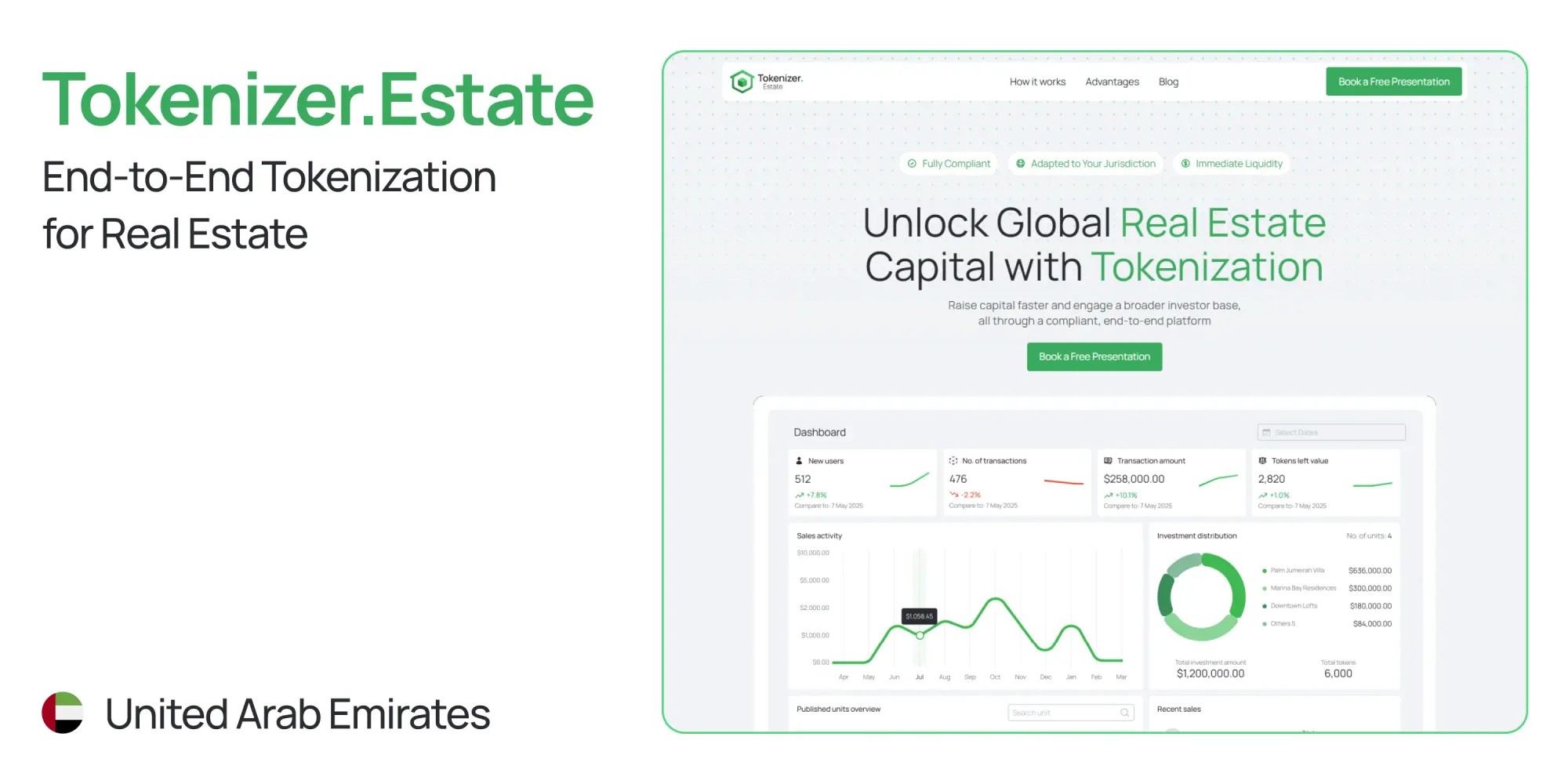
Tokenizer.Estate (UAE) is a turnkey platform built for property issuers. It handles everything from legal structuring to smart-contract deployment and investor portals. Crucially, Tokenizer.Estate emphasizes compliance: it provides “all the necessary compliance documents and procedures” and an integrated KYC/AML onboarding so issuers can accept investors worldwide with minimal friction. At the same time the platform is fully white-label: clients get a branded investor portal and back‑office dashboard under their own name. In practice this means a developer or fund can launch security tokens on any compliant blockchain, track each share and transaction in one dashboard, and automate dividend payments – all without building tech from scratch. As a complete solution, Tokenizer.Estate lets businesses digitize property ownership globally while staying “fully compliant” and in control.
2. Brickken – Multi-Asset SaaS Tokenization Platform
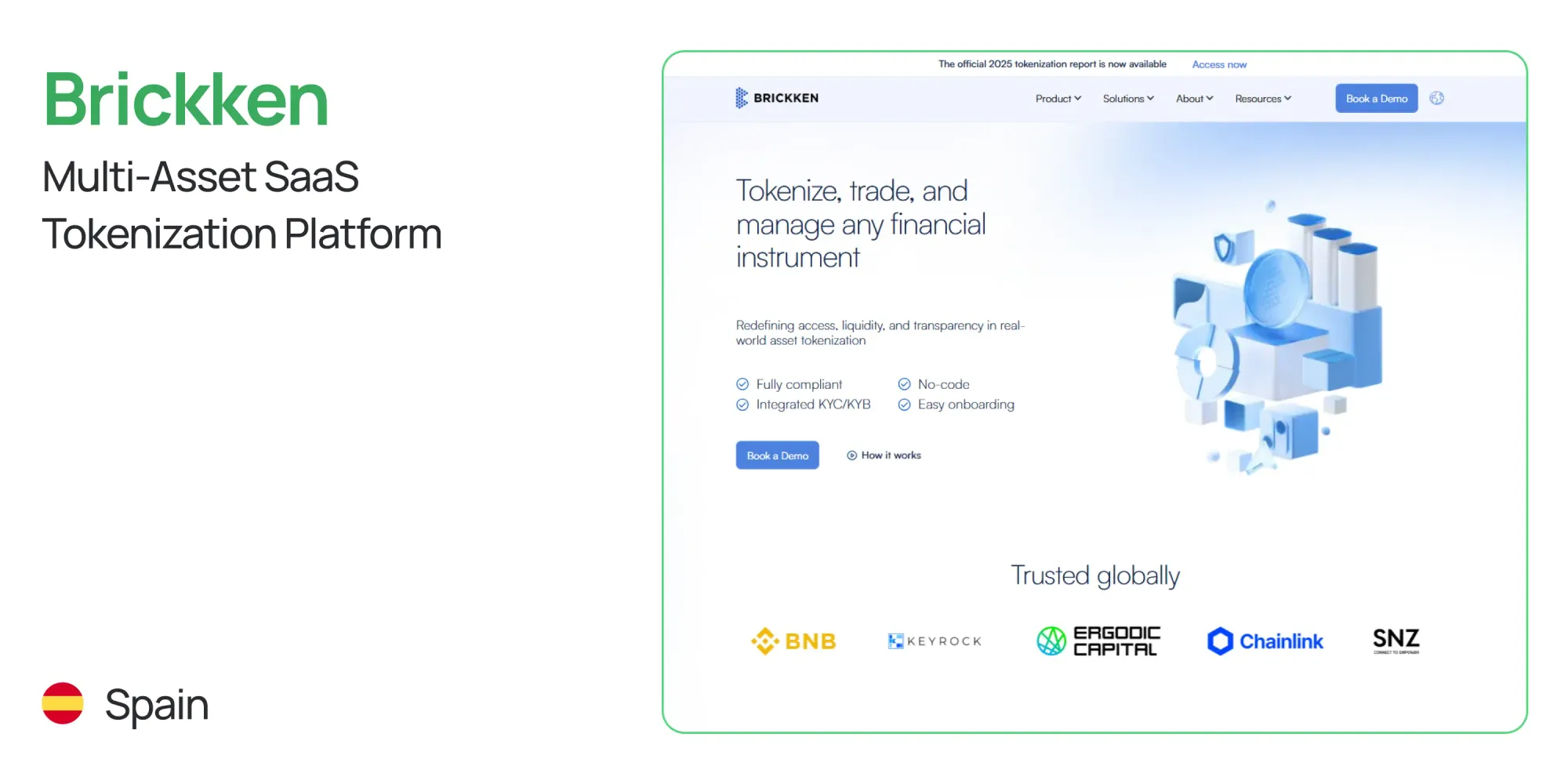
Brickken (Spain) is a well-known institutional platform for real-world asset tokenization. It offers a comprehensive SaaS toolkit that supports multiple asset types (equity, debt, revenue-sharing, real estate, etc.) across various blockchains. Brickken’s platform has tokenized over $250–260 million of assets in 14 countries since its 2023 launch. It provides no-code issuance, an API, sandbox testing, and white‑label investor portals. Onboarding and compliance features (KYC/AML, document signing) are built in, and Brickken supports payments in fiat or crypto. In early 2025 Brickken expanded its reach by deploying on Polygon PoS, giving clients a scalable, low‑cost blockchain option. In short, Brickken positions itself as a one-stop, modular infrastructure for firms looking to issue regulated security tokens. Its breadth of features – from automated workflows to a partner marketplace – make it a leading choice for enterprises entering real-estate tokenization.
3. Tokeny – Compliance-First Tokenization (ERC-3643)
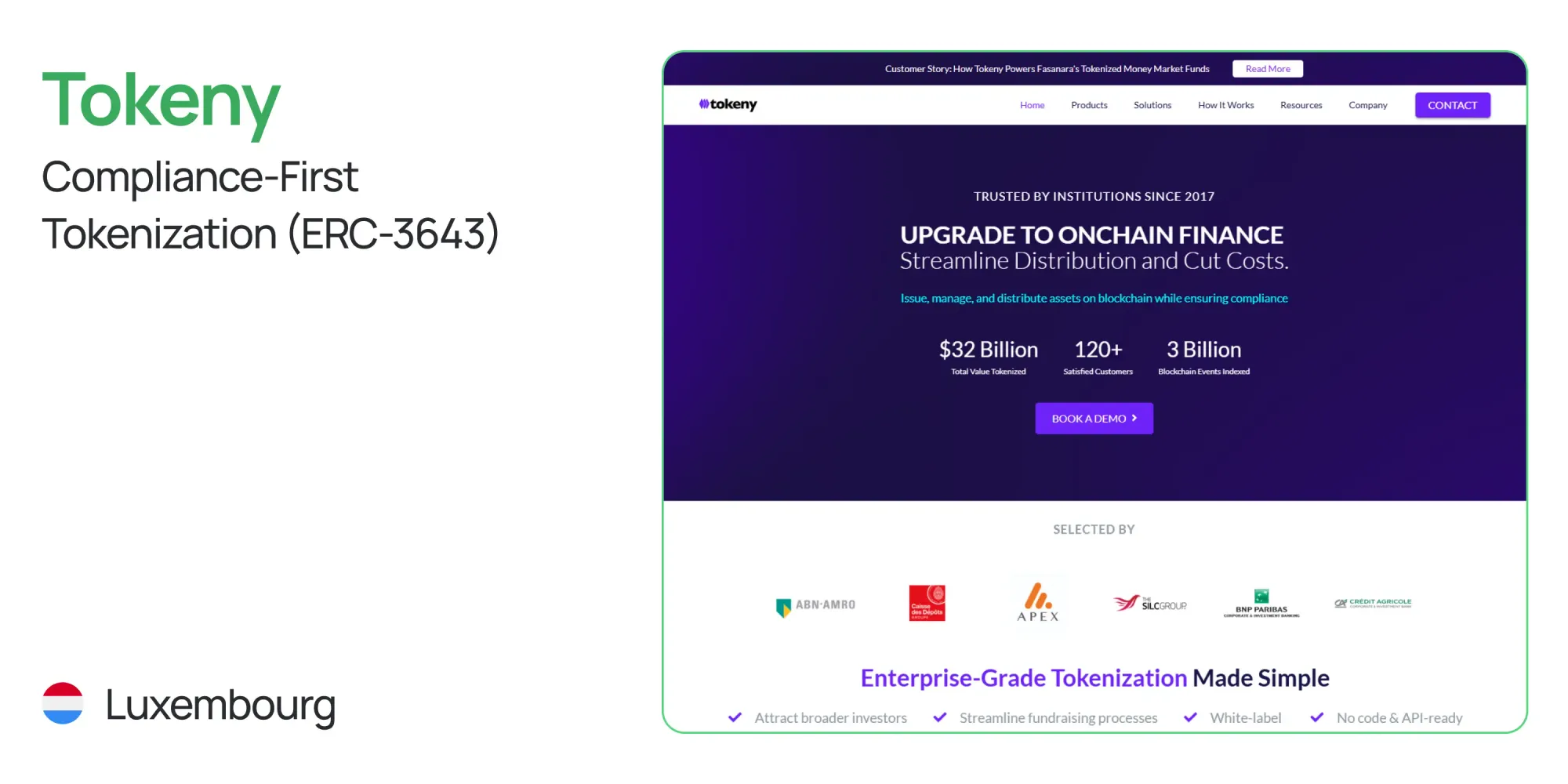
Tokeny Solutions (Luxembourg) is an end-to-end security-token platform known for strict regulatory compliance. Backed by Euronext, Tokeny provides issuers (issuance desks, banks, corporates) with a modular system to create and manage tokenized securities on public blockchains. Its patented T‑REX standard (based on ERC-3643) embeds compliance rules (whitelisting, transfer restrictions) directly into the token smart contract. This means tokens are “compliant by design” from day one. Tokeny’s platform handles investor onboarding, corporate actions, and transfer approvals through a user-friendly dashboard. In practice, Tokeny has been used by major institutions for equity and bond token offerings in Europe. Its focus on KYC/AML and legal structuring makes it a popular B2B choice for projects that need banking-grade compliance and a proven track record.
4. DigiShares – White-Label Real Estate Crowdfunding Platform
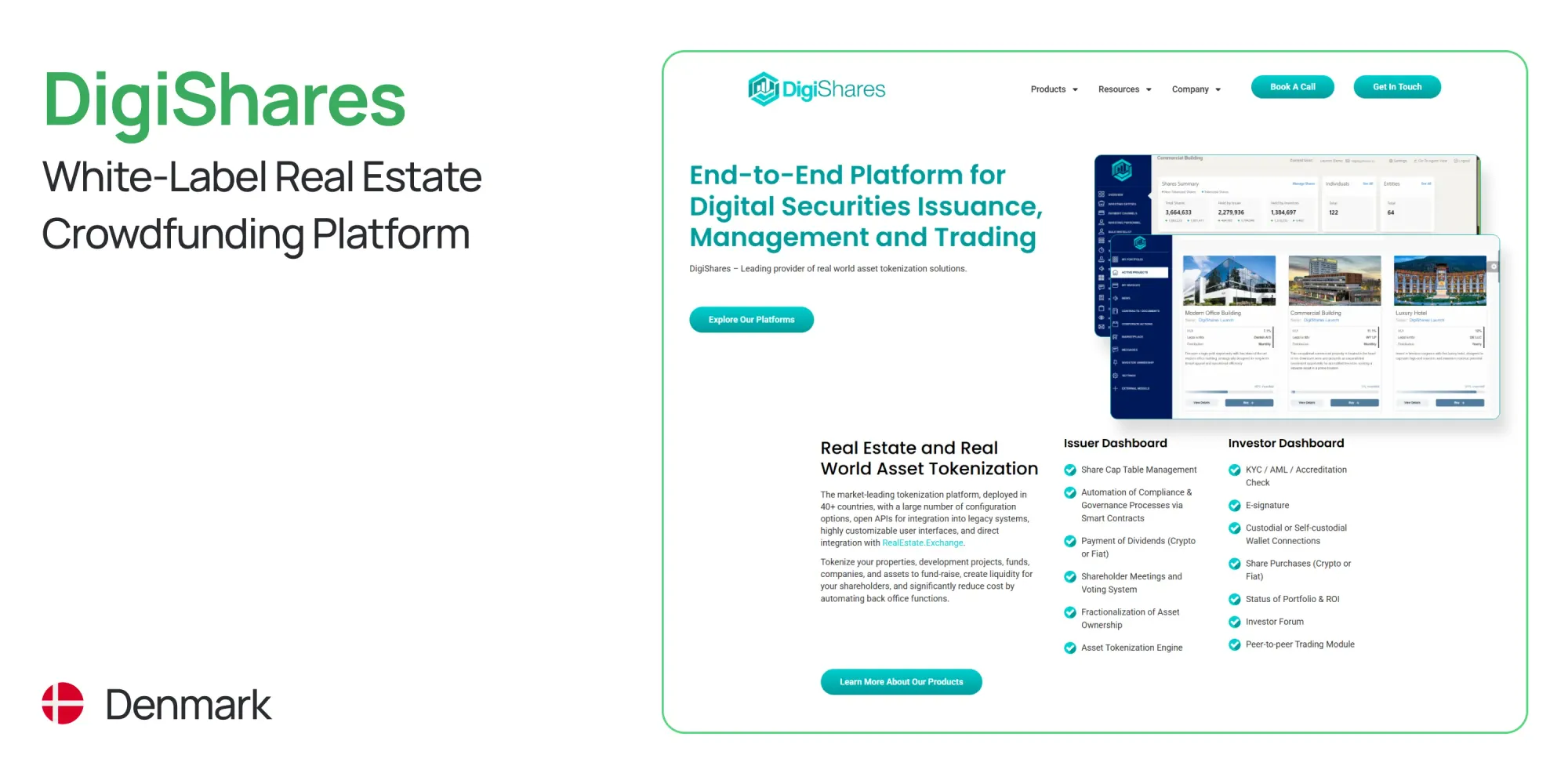
DigiShares (Denmark) specializes in real estate crowdfunding and tokenization. It offers a turnkey solution that lets property owners or funds launch their own token-based investment portal. Under the hood, DigiShares automates the entire lifecycle: investor KYC/AML, digital signature of documents, cap‑table management, dividend distribution, and even an internal OTC marketplace for token trading. The platform supports multiple fiat currencies and connects to custodians/exchanges for liquidity. It emphasizes security with audited smart contracts and full compliance support. In one phrase, “DigiShares offers an end-to-end real estate tokenization platform that supports every phase of your investment lifecycle”. For example, a developer can use DigiShares to create a limited partnership or LLC for a building, issue fractional tokens to investors, and manage shareholder voting – all with built‑in reporting and investor communication. This white-label approach allows banks or real estate firms to plug in and go: they get a legal and technical framework without building from scratch.
5. Blocksquare – Notarized Tokenization with Legal Claims
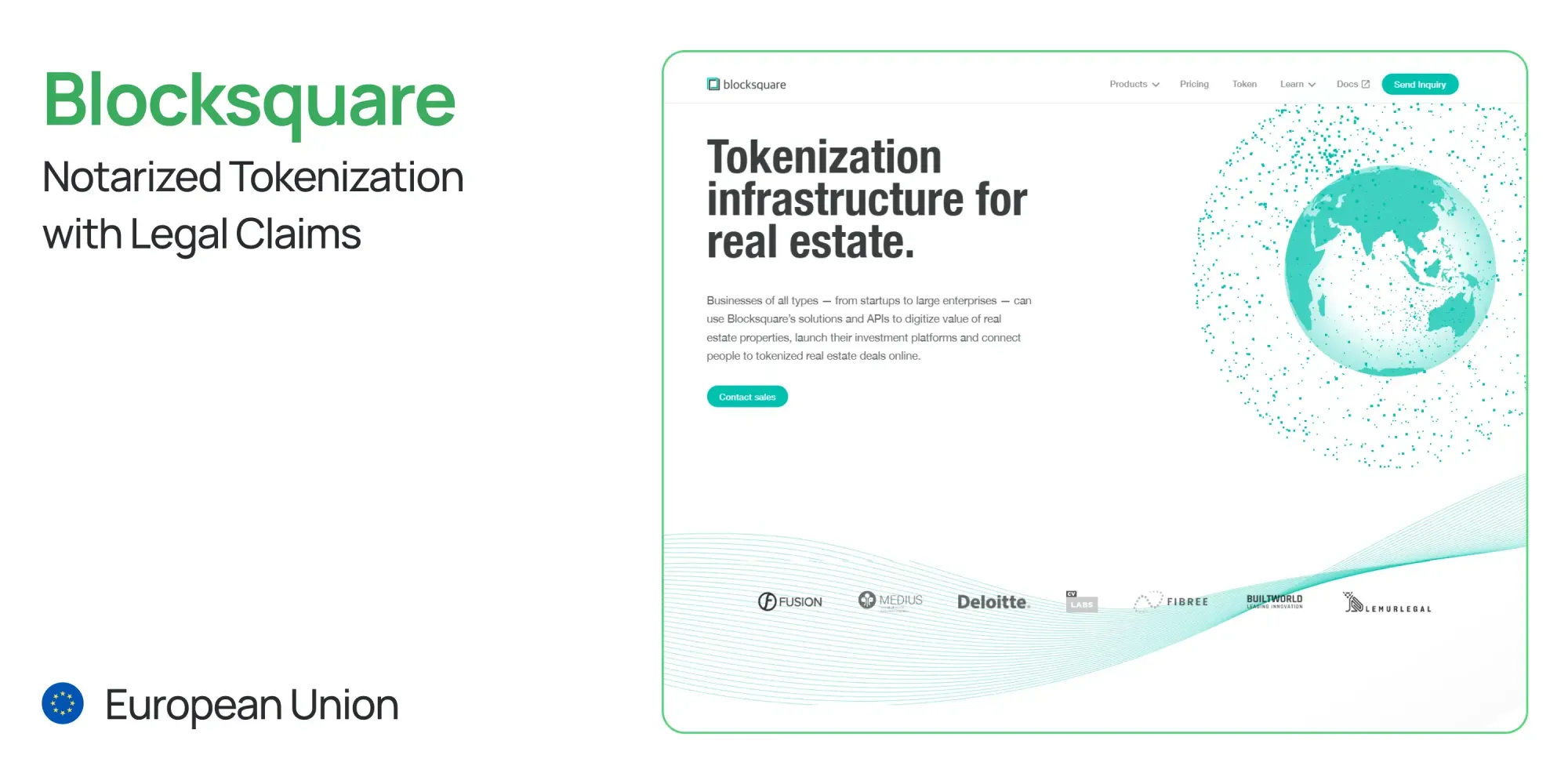
Blocksquare (EU) takes a legally rigorous approach. Its platform integrates with land registries via notarized agreements, so that on-chain tokens carry a direct, enforceable claim on the underlying property. In other words, every Blocksquare token is tied to a deed in the real-world registry. This “EU-compliant” framework gives token holders real legal recourse – not just a digital IOU. Blocksquare’s tooling is aimed at companies and governments: it streamlines issuance of property-backed tokens while preserving investor rights. Its approach has already seen real use. For instance, a tokenization of a $5.4 million Florida office building (a Vera Capital project) was built on Blocksquare’s infrastructure. The result was a fractional-ownership offering on the blockchain where investors hold notarized claims – marrying on-chain efficiency with traditional legal protection.
Comparison of leading B2B Real-Estate Tokenization Platforms
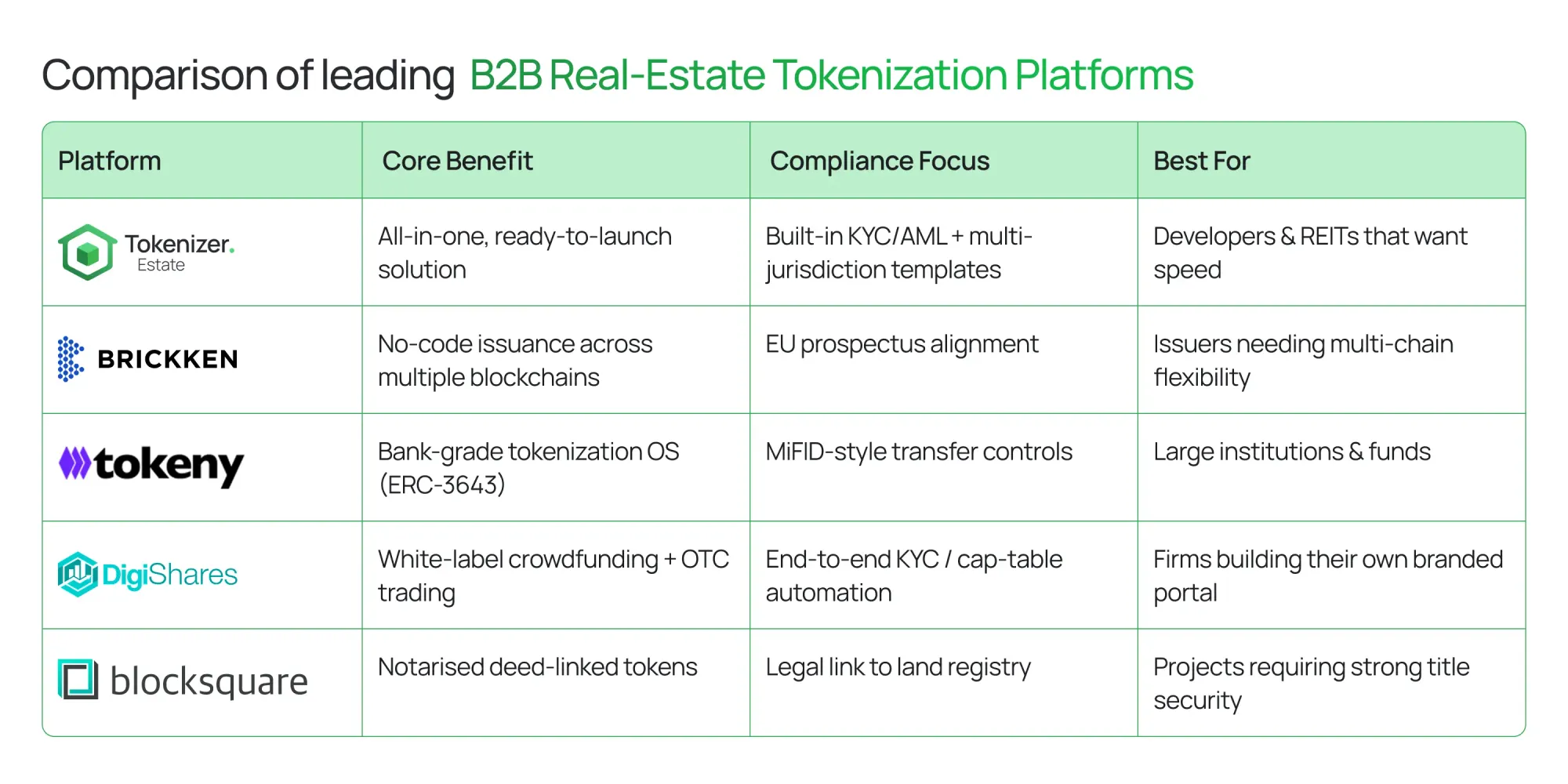
Tokenization platforms vary in focus, but all these tools share key capabilities: compliance, investor management, and digital custody of assets. As one industry report notes, “tokenization is no longer just an idea – it’s a working system with live platforms, traded tokens, and real returns”. For businesses aiming to raise capital or improve liquidity, these B2B solutions turn real estate into programmable digital shares. By choosing a platform with the right features (multi-chain support, audit trails, KYC/AML, etc.), developers and funds can tap global investors and secondary markets in a compliant way. These five platforms represent the leading options today for bringing property assets on-chain.
Stay informed.
Subscribe to blog.tokenizer.estate for expert insights, real-world case studies, and the latest updates in real estate tokenization 🏠

